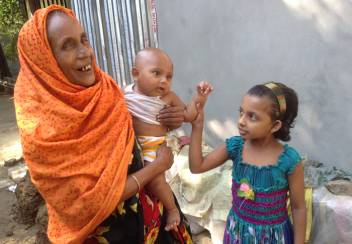 8 March is International Women’s Day. It is an occasion to celebrate women from all walks of life, including older women who are often some of the most marginalised and forgotten individuals in society.
8 March is International Women’s Day. It is an occasion to celebrate women from all walks of life, including older women who are often some of the most marginalised and forgotten individuals in society.
In Bangladesh, the number of people over the age of 60 is projected to increase from about 10.3 million people in 2012, to 43.6 million in 2050. Like in many other developing countries, people encounter a variety of problems in their old age in Bangladesh.
Older women often face more challenges than average; suffering a double burden of discrimination as they are both “female” and “older”. Many still play a huge role in serving their families or as caregivers.
Hidden contributions of older women
The ready-made garment (RMG) industry is currently Bangladesh’s most important labour sector, making up 13% of the GDP. Mainly young people work as the diving force of the RMG sector and 90% of them are women. The RMG sector also ensures the indirect employment of 10 million people.
The role of these low paid working people is being increasingly acknowledged, however do we ever recognise the hidden contributions of older people, mainly older women? Yes, the contribution of older women. They are hugely engaged in the RMG sector and share a great deal of the burden of work. However, this goes for the most part completely unseen.
Caring grandmothers
Let me tell two stories. Komola, 22, is a widow with two daughters. She came to the capital, Dhaka two years ago after her husband’s death. Now she works at a sewing factory and lives in a tiny room along with three others in an urban slum.
Her children are being looked after by her mother, who is 62 and lives in Panchagarh, over 500 kilometres from the capital. Komola only gets one annual vacation of three days during Eid, which is not enough to support either her mother or children.
Another story is about Alif. He is only three and a half years old and has already lost the dearest person to him – his mother – who would, otherwise, have been by his side teaching him all his childhood lessons. His beloved mother, Morzina, was a machine operator in a garment factory in Rana Plaza, which collapsed one year ago. The tragedy cut short Morzina’s life at 21. Now Alif is being looked after by his grandmother.
The stories are not just limited to Komola and Alif. It is very common among the 3.1 million workers who migrate from the villages towards Dhaka and Chittagong where most factories are located. They have to leave their children and older parents behind.
Unsung heroes
From here older women are forced to look after their grandchildren without any formal support from the factories or the government. The only support available is the old age allowance of 300 taka (US$3.9) per month which 2.5 million older people receive or the same amount in widow allowance that just under 1 million women get.
Without any support, older women everywhere in Bangladesh are quietly raising the next generation. It is high time to include these older grandmothers who are left behind in all development programmes.
I would like to dedicate this International Women’s Day to these unsung heroes.
Read about what we’re doing for International Women’s Day 2014
Find out more about our work with older people in Bangladesh
